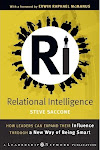Relationally intelligent leaders refuse to invade people’s space, but instead, wait to be invited into it so their influence expands rather than diminishes. They know this is where true relational influence happens.
One of the primary ways to identify whether we’re being invited into the "relational space of others" comes down to our ability to read and discern non-verbal and emotional "signs." People emit invisible vibes (or signs) that tell us something. Everyone sends them out, thus communicating whether they’re open or closed off to us. This is revealed primarily through body language, but also through the emotional energy a person emits. For example, someone could maintain a welcoming and open spirit, or they could emit an aloof and distant one. People tell us without words whether they want our advice or input, and relationally intelligent leaders pay close attention.
Sometimes people come right out and tell us directly that they don’t want our advice, but most people choose to send non-verbal cues to try and tell us to back off, or at least that our input isn't welcomed. They may do this for a plethora of reasons. It isn't necessarily a right or wrong thing. In fact, sometimes it’s very appropriate for a person to resist our coaching or wisdom because we haven’t earned the right to be heard.
Sometimes their non-verbal emotion-charged emissions are obvious and strong, while other times they’re subtle and difficult to sense. Often we can identify them, but when we can’t, we must remember to be direct and to ask.
We could ask something like, “Do you mind if I share some insight into what you’re going through?” This gives a person an opportunity to invite us into their relational space and welcome our input. It doesn’t always mean they’ll directly say no, but if they withdraw or seem resistant, they’re probably trying to tell us, “No thanks.” If someone is sharing a personal struggle with us, we could ask them, “Are you looking for help and advice, or are you looking just to talk this out?” This helps inform us on how to best respond to the person in a way that honors and respects their journey and our relationship with them.
All of this doesn’t mean there aren’t moments when we push through resistance and challenge people to grow and change. And to be clear, I’m certainly not advocating for some passive way of leadership. It’s just that in many leadership circles, we rarely seek to honor this invitational dynamic, we continually overlook the non-verbal cues and often fail to ask permission to push rather than forcing our agenda upon someone.
I'm convinced that Jesus is the most relationally intelligence man to have ever lived. And if we look at his life, Jesus’ way of leadership was not one that forced an invasive agenda upon people rather it was one that served others with great honor and respect. And since God doesn’t force Himself on people neither should we. But God does jump at the chance to serve people if they invite Him in. His posture is always bent toward serving others, and He’s a model we can emulate as we strive to become more relationally intelligent in our leadership.
Steve Saccone's Reflections on a New Way of Being Smart
Relational Intelligence
Create Movement. Remember to Love.

- Steve Saccone
- Los Angeles, CA, United States
- Steve is a leadership catalyst, writer, and creativity consultant. He works with Mosaic, a spiritual community in Los Angeles who strives to empower creativity of the human spirit, as well as cultivate relational and spiritual health. Steve also works as a Field Advisor for the Gallup Organization, serves as Director of Protege, a 2-year Global Leadership Program, and is an Adjunct Professor and guest lecturer for numerous universities.
Reading That's Worth Your Time
- A Whole New Mind: Why Right Brainers Will Rule the Future
- Drive: The Surprising Truth About What Motivates You
- How to Think Like Da Vinci: Seven Steps to Genius Everyday
- Lynchpin: Are You Indispensable?
- The Journey of Desire: Searching For The Life We've Only Dreamed Of
- Who's Your City? How the Creative Economy Is Making Where to Live the Most Important Decision
